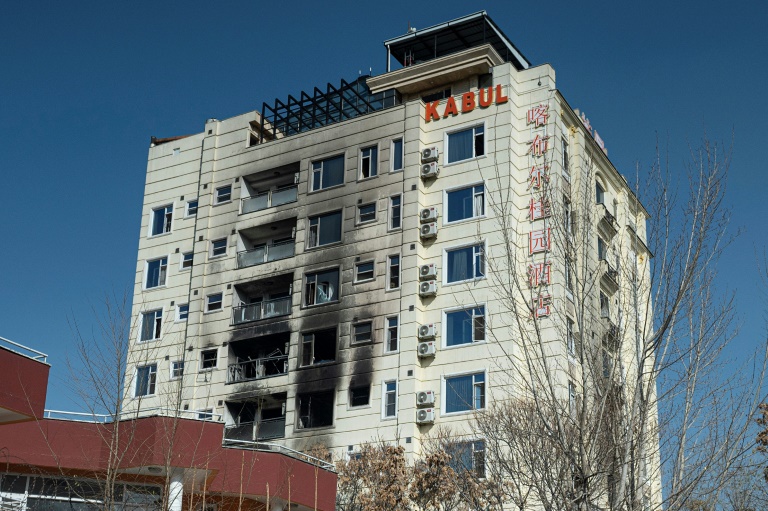Beijing ‘shocked’ by attack on Afghan hotel hosting Chinese visitors

The Kabul Longan Hotel in the Afghan capital, a day after the deadly Islamic State attack
Kabul – Beijing said Tuesday it was “shocked” by a deadly attack on a Kabul hotel popular with Chinese business visitors, adding that five of its nationals were wounded.
The Taliban claim to have improved security since storming back to power in August last year but there have been scores of bomb blasts and attacks, many like this one claimed by the local chapter of the Islamic State group.
“This terror attack is abominable and China is deeply shocked,” foreign ministry spokesman Wang Wenbin said in Beijing.
“As far as we know, five Chinese citizens were injured in the terrorist attack, and several Afghan military and police were also killed.”
The Taliban’s chief spokesman, Zabihullah Mujahid, however, said Monday only three attackers were killed in the raid on the Kabul Longan Hotel. Two foreigners were hurt escaping from the building, he said.
Mujahid told AFP Tuesday “a few other” injuries may have since been reported.
The Italian non-governmental organisation Emergency NGO, which operates a hospital just one kilometre from the blast site, said Monday they had received 21 casualties, including three people dead on arrival.
Taliban casualty figures following such incidents are usually lower than those reported by hospitals and other independent sources.
On Tuesday, the hotel facade was blackened by fire that erupted during the attack and windows of the 10-storey building had also been blown out.
“I heard the sound of a loud explosion and shots. Of course everyone was scared,” said a vendor in an adjacent street, asking not to be identified.
The Islamic State group claimed responsibility for Monday’s attack, issuing photos of two men it said were the perpetrators.
It also claimed responsibility for a suicide bombing outside the Russian embassy in September that killed two staff, as well as an attack on Pakistan’s mission this month that Islamabad decried as an assassination attempt against the ambassador.
No country has recognised Afghanistan’s Taliban government but China, Russia, and Pakistan are among a handful that have maintained their embassies in Kabul.
“This looks like (at least in part) a campaign to dent the efforts of the Taliban, IS-K’s rival, to gain legitimacy both at home and abroad,” tweeted Michael Kugelman, director of the South Asia Institute at the Wilson Center think tank.
China, Pakistan, and Russia were expected to base decisions about international recognition on security rather than the Taliban’s human rights record, he said.
In Beijing, Wang reminded Chinese nationals that foreign ministry advice was to evacuate from Afghanistan as soon as possible.
Chinese business visitors have flocked to the country since the Taliban’s return in pursuit of high-risk but potentially lucrative business deals.
China shares a rugged 76-kilometre (47-mile) border with Afghanistan and it has long feared Afghanistan could become a staging point for minority Uyghur separatists in China’s sensitive border region of Xinjiang.
